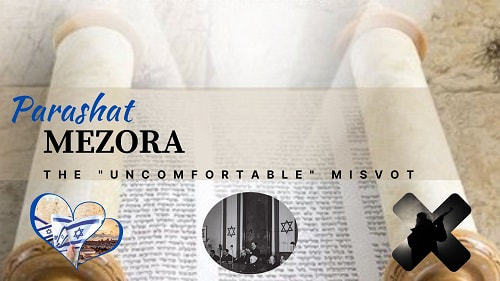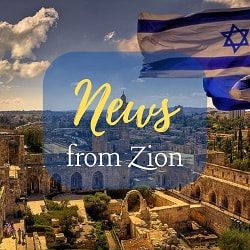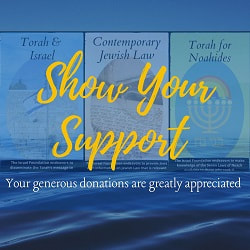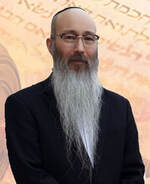|
By: HaRav Menashe Sasson Reporting from Jerusalem, Israel Published in the U.S.A. In the aftermath of deadly terrorist attacks which were committed by Arabs in Bnei Brak (5 killed), Beersheba (4 killed), and Hadera (2 killed) during the month of Adar II 5782 (March 2022), and following a Facebook post praising the attacks, allegedly made by an Arab teacher who is employed by the Israeli school system and which allegedly stated, “God bless the heroes, and bless the hands that did the deed,” the question was raised, “If the Israeli government had the will to stop the current terrorist attacks, and prevent future terrorist attacks, what could it do?” The answer to this question is not difficult, but it does need a little foundational information. A Torah command or Rabbinical obligation (as well as an act performed in conformance therewith) is known as a “misva” [מצוה]; the plural being “misvot” [מצוות]. For the purpose of a discussion of Parashat Mezora, there are two classes of misvot [מצוות]: “Comfortable Misvot,” that is, misvot which religious Jews openly discuss and generally enjoy performing and, on the other hand, “Uncomfortable Misvot,” those misvot which, typically, are not freely discussed. The Uncomfortable Misvot can further be divided into two subcategories: those which, typically, are not openly discussed, but are generally performed and those which, typically, are not openly discussed and which are seldom, if ever, performed, even though performance is possible. Parashat Mezora introduces us to the Uncomfortable Misva of Taharat HaMishpacha [טהרת המשפחה] (family purity) which, for reasons of modesty, is typically not discussed openly, especially in mixed company, but which is observed by religious couples. Examples of Uncomfortable Misvot which typically are not discussed and which are seldom, if ever performed, include self-defense, capital punishment, Yeshuv Eretz Yisra’el (the obligation to live in the Land of Israel), and expelling from Eretz Yisra’el those inhabitants of the land who claim a right thereto which is superior to that of the Jewish people. Regarding self-defense, Parashat Mishpatim informs us that: “If a thief is discovered while tunneling in, and he is struck and dies, there is no blood-guilt on his account. If the sun shone upon him, there is blood-guilt on his account.” Shemot 22:1-2. The Talmud explains that “[i]t is . . . assumed that before someone burglarizes a house, he [has already] decide[d] to kill the occupant, should it become necessary to do so. For this reason, the occupant is permitted to kill the burglar.” T.B., Masekat Sanhedrin, 72a. As for capital punishment, Parashat Emor states that “he who mortally strikes [יכה] any person shall surely be put to death.” Vayyiqra 24:17. Halakha which applies this pasuk goes into great detail regarding offenses which are punishable by death. Mishneh Torh, Hilchot Sanhedrin 6:1-9:3. As can readily be seen, the Torah does not merely authorize capital punishment, it mandates it in certain circumstances. Concerning Yishuv Eretz Yisra’el [ישוב ארץ ישראל], that is, the misva to settle in Eretz Yisra’el, also known as making Aliyah [עליה], which in Hebrew literally means to “go up,” the Talmud states:
T.B. Masechet Ketuvot, 110b, quoting Vayyiqra 25:38. Furthermore, the misva of living in Eretz Yisra’el is timeless. The Shulkhan Arukh states that: “If [a husband] proposes to ascend to Eretz Yisra’el and [the wife] does not want to [go], [the husband] must divorce her. . . . [And if the wife] proposes ascending [to Eretz Yisra’el] and [the husband] does not want to [go], he must divorce her.” Shulkhan Arukh, Even HaEzer 75:4. Lastly, regarding the expulsion from Eretz Yisra’el of those inhabitants of the Land who claim a right thereto which is superior to that of the Jewish people, HaShem, in His infinite wisdom, knew that the occupants of the Land would not voluntarily relinquish their control over Eretz Yisra’el. Thus, HaShem commanded that the Jewish people conquer the Land and expel the conquered inhabitants, and enjoined the Jewish people from entering into an agreement with conquered inhabitants that would allow them to remain in the Land.
Shemot 34:11-17. The Halakha relating to non-Jews living in Eretz Yisra’el recognizes two classes of people: those who claim an ownership or similar interest in Eretz Yisra’el and those who do not claim any such interest. Regarding those who claim an ownership interest in the Land, the Torah is not merely referring to ancient civilizations who just happened to be occupying Eretz Yisra’el prior to the arrival of the Jewish people; rather, the Torah is referring to any people – for all time – who claim a legal right to Eretz Yisra’el. According to the Or HaChaim:
Abarbanel, Commentary on Shemot 34:11-12. With this background, we now return to the question which was posed at the beginning of this article, to wit: “If the Israeli government had the will to stop the current terrorist attacks, and prevent future terrorist attacks, what could it do?”
The combination of these aforementioned policies, over the long-term, would both decrease the opportunity for non-Jewish Arabs to commit terrorist attacks, while also incentivizing them to emigrate to a another (likely Arab) country. All it would take to implement these reforms is the political will to do so, and faith that blessing will flow to the Jewish people for performing HaShem’s “Uncomfortable Misvots.” שבת שלום Shabbat Shalom! Copyright © The Israel Foundation. All Rights Reserved.
0 Comments
Your comment will be posted after it is approved.
Leave a Reply. |
THE ISRAEL FOUNDATION





